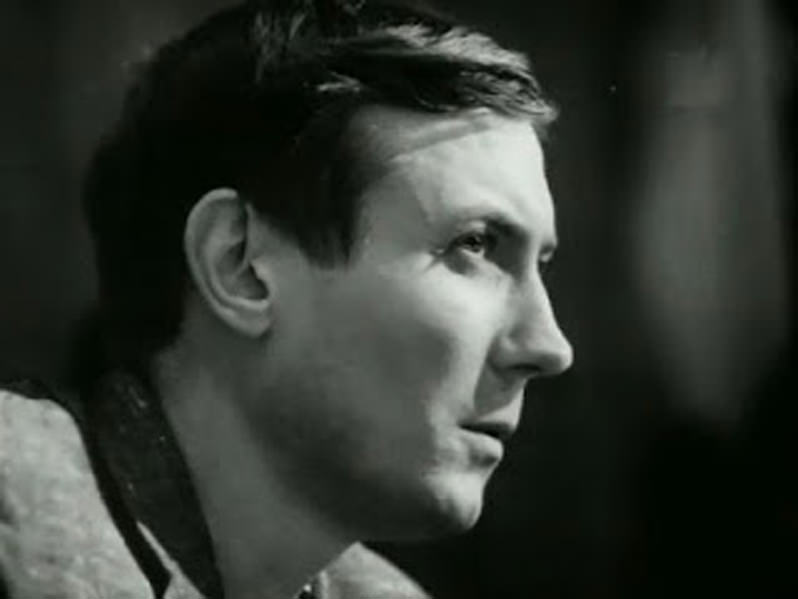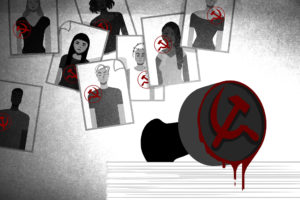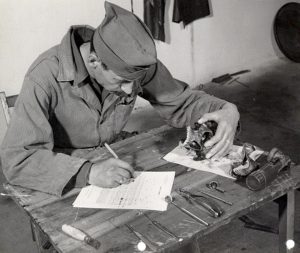My Yevgeny Yevtushenko (1932-2017)
The Russian poet, who died Saturday at 83, was at the forefront of the cult of poetry that swept the Soviet Union in the decades after Joseph Stalin's death.
Yevgeny Yevtushenko in the 1965 film, “I Am Twenty.” (The Noise of Time)
I saw him for the first time at the Kafe Molodezhnoe (Youth café), the only establishment of its kind in the true, Parisian, sense of the word in Moscow circa 1962. If you made it through the door early enough, you could spend the whole evening there listening to jazz while nursing a cup of coffee and/or a bottle of wine… This was my first and only visit there. Yevtushenko appeared late, and there was a palpable stir in the cafe as he briskly walked across the room and settled in at a table already crowned by a circle of beautiful people. After some minutes, he got up and stepped onto the slightly elevated stage. A wave of admiring murmur lapped at his feet. He began reciting his poetry.
I did not really know his work and could not make out a single familiar poem but the recital lasted for awhile. Sixteen or seventeen at the time, I had already been “turned” by the forbidden poetry of Marina Tsvetaeva and Osip Mandelstam, and what I was hearing did not impress me. Yet, I, too, was dazzled by the glow and the vibe that emanated from this man, still young looking, tall and handsome, and dressed to a T with chic informality. Every item of clothing on him came from “over the hill” and was the envy of every kid, bitten, like me, by the 1960s bug of Western individualism, youth culture, and craving dignity in appearance. Around that time, someone offered me a ticket to go and see him recite at what was then the newly-minted Luzhniki Stadium. I passed. And why would I go? I preferred the secret private cult of opaque modernist poetry — the “stolen air,” in Mandelstam’s phrase — to the mass craze for the uncomplicated verse of the official Soviet Fronde, the poets who accepted compromise in exchange for permission to publish, make money, and, coveted most of all, travel abroad.
Yevtushenko meets President Nixon. (The Noise of Time)
Many years later, already in the U.S., I remember Joseph Brodsky referring to Yevtushenko in disparagement as “poetry’s prostitute” while apologizing to the actual practitioners of the world’s oldest trade for using their metier as a qualifier for this sullied name. Someone then asked me if I agreed with Joseph. I shrugged. What I knew of Yevtushenko’s poetry did not impress me but it belonged to its time and had an impact. As much as it was hard for me to dismiss Yevtushenko, it was hard for me to suppress my distaste for his verse and his public style.
Still, there were two fragments of his poetry that stuck in my memory like a fly in a piece of amber and are probably part of my generation’s urban lore:
1. “He wore slim pants and read Hemingway” – the phrase pretty much defined me as a type in my teen years, despite the fact that I didn’t quite vibrate to Hemingway (that came later).
2. “And what comes next? And what comes next? / You whispered to me after sex”. In the Russian original, “sex” is implied but it needs to be there in English to render the post-coital vibe of the verse: the young woman, a virgin, is asking the young man with whom she had just had sex what will happen next to their relationship (in Russian, past tense singular has a gendered ending). These lines, too, were emblematic of the generation, one before the pill, that was destined to making out under the Damocles’ sword of unwanted pregnancy.
Perhaps my last direct encounter with Yevtushenko’s verse occurred in 1963 at the Moscow Conservatory — at the premiere of Shostakovich’s Thirteenth, “Babii Yar” Symphony, set to Yevtushenko’s 1961 poem that had apparently enraged Khrushchev. In my young and heavily Jewish bohemian milieu, the poem, a sharp condemnation of Soviet anti-Semitism, was too straight-forward, almost agit-prop, to rank as serious poetry.
With Dmitri Shostakovich at the premiere of the 13th Symphony. (The Noise of Time)
But there I was standing in the foyer of the Grand Hall of the Moscow Conservatory, trembling with excitement: I was about to hear the world premiere of the “Babi Yar” Symphony of my beloved, saintly Shostakovich. Doubt crept into my mind: perhaps, I did not understand something about Yevtushenko? The poem was good enough for Shostakovich who, we all knew then, had withstood enormous pressure from the Kremlin to bring about this first performance. Could Shostakovich have redeemed Yevtushenko? To my snobbish mind, however, the music completely overshadowed Yevtushenko’s verse. I was soon confirmed in my prejudice. In an odious move, Yevtushenko backed down and produced an anodyne version of “Babi Yar” to please Khrushchev’s cultural watchdogs. No, I was not surprised …
Minister of Culture Yekaterina Furtseva, left, Yevtushenko, and artist Ernst Neizvestny (far right) in the1960s. (The Noise of Time)
Unless challenged, tastes and opinions acquired early in life stick to your mind like barnacles to the hull of the ship, and I have never had the occasion to reconsider my attitude toward Yevtushenko. To me, his poetry is a form of art that is compromised by its government permit, and it is too late for me now to change my mind. And yet, I must acknowledge, his was a lifelong service to the Russian poetic tradition in which the poet, in Yevtushenko’s own, somewhat tinny, phrase, is “more than just a poet.” And sometimes, I should add, a poet can be less than one, too.
If Brodsky was right, and we should see Yevtushenko as a poet who had his Muse ply the world’s oldest profession throughout his career, we must remember him as a holy prostitute – sacred to the cult of poetry that swept the Soviet Union in the decades after Stalin’s death. This cult was as diverse, ambiguous, and full of contradictions as was Russia itself during Yevtushenko’s long lifetime.
The archetypal Soviet “cult” poet, Vladimir Mayakovsky, whose art encompassed many political compromises, committed suicide at Eastertide, 14 April 1930, at the age of 36. Yevtushenko died on April Fool’s day at the ripe old age of 83. RIP.
Gregory (Grisha) Freidin, professor emeritus of Russian at Stanford University, grew up in Moscow and has lived in the U.S. since 1971. Author of a critical biography of Osip Mandelstam, “A Coat of Many Colors,” and Isaac Babel (forthcoming), he has written on Russian literature, culture and politics for, among others, the New Republic, The New Criterion and the Los Angeles Times. Since 2010 he has been maintaining a blog, The Noise of Time.
With an uncertain future and a new administration casting doubt on press freedoms, the danger is clear: The truth is at risk.
Now is the time to give. Your tax-deductible support allows us to dig deeper, delivering fearless investigative reporting and analysis that exposes what’s really happening — without compromise.
Stand with our courageous journalists. Donate today to protect a free press, uphold democracy and unearth untold stories.









You need to be a supporter to comment.
There are currently no responses to this article.
Be the first to respond.